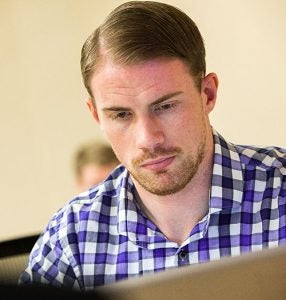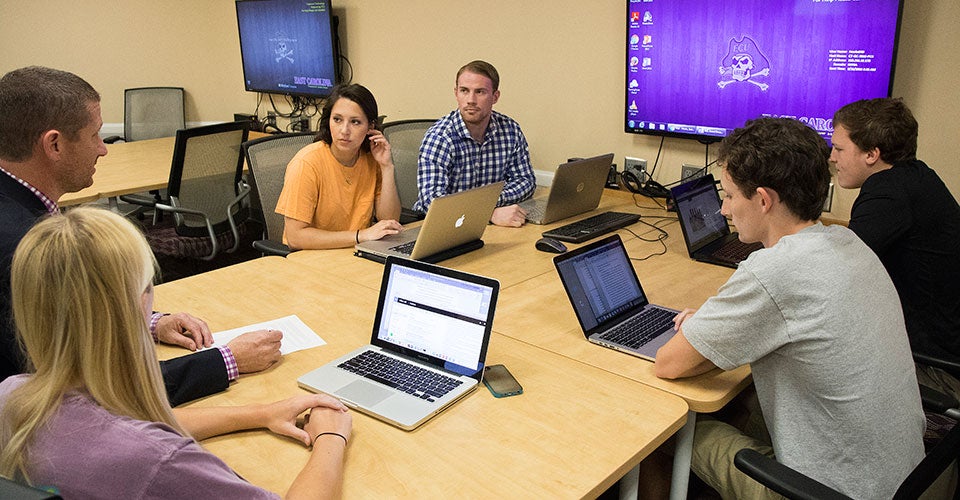SMALL BUSINESS, BIG IMPACT
ECU's Small Business Institute brings current and future entrepreneurs together
At the East Carolina University College of Business, the “E” word is everywhere you look.
Entrepreneurship is about taking an original idea and creating a practical, sustainable business plan to take it to market. Professor Michael Harris has created a program that offers specialized assistance to regional small business owners while providing students with a hands-on entrepreneurial experience.
“Service to the region is at the core of the ECU mission and students in the SBI program take that to heart,” said Harris, who teaches small business management. ” The program creates a win-win situation where students learn the skills and resources needed to start and manage a business, while our clients get a comprehensive report with recommendations on how to best resolve critical issues .”
While local businesses benefit from a free consulting partnership, students experience practical applications of lessons they’ve learned throughout the College of Business undergraduate program. At the conclusion of the semester, student teams deliver a comprehensive consulting document to their respective clients, along with an oral presentation of information. Each project presents teams with more than 100 hours of work, research and business meetings that typical coursework might not offer.
The ECU Small Business and Technology Development Center plays a critical role by identifying clients and mentoring students in the semester-long project, Harris said.
This year’s students worked with businesses such as the ABC Commission of Craven County and Great Harvest Bread Company in Greenville to evaluate and analyze processes, and create sustainable business plans.
Not as easy as 1-2-3
Darin Hooks, a U.S. Air Force veteran and senior graduating this summer, is in the final stages of Harris’ course. He and teammates Grey Johnson, Kaitlin Quinn, Paige Harrison and Kevin Coughlin have spent the spring semester partnered with the ABC Commission of Craven County in an effort to create a sustainability plan for future growth.
“What we found was an 80-year-old organization that was looking for some suggestions to better serve its target market, train its employees and have continued success in a highly regulated industry,” said Hooks.

The team spent the semester researching best practices for state-run liquor stores and how to implement those while working within the regulations for alcoholic beverage sales. They will be presenting a comprehensive recommendation package emphasizing three areas of improvement: professional development, marketing and strategic planning.
This plan includes professional insights into the commission’s personnel development and leadership program, overview of current and future marketing strategy, locational analysis for future stores and market trend analysis for product placement and procurement.
“We have set out both long- and short-term objectives that are feasible, cost effective and attainable,” said Hooks. “Through our combined intelligence, creativity, and resolve, we have produced a recommendation that we are truly proud of.”
Bread winners
Morgan Harvey and Nate Dadosky, team members from Harris’ fall semester, said the experience better prepared them for graduation and moving into the College of Business’ Masters of Business Administration program. Both were able to glean insights from Harris’ hands-off teaching methodology that made the course seem like a real world job instead of a traditional class with assignments and tests.
“This experience really drives home the significance of the things you read in textbooks and may have glossed over,” said Dadosky. “I want to be a management consultant after graduating the MBA program, and this has really given me insight into meeting with clients, the analysis process and how to build an implementation plan.”
Harvey, Dadosky and their teammates partnered with local Great Harvest Bread Company owners Gregg and Kim Green to build a sustainability plan that included accounting insights, a strategic plan for the expansion of their catering business and a strategic marketing plan.
“The business was still in survival mode when the team joined, having just opened recently,” said Harvey. “We were able to objectively see their opportunities and strengths while giving them suggestions on how to grow and sustain for long-term success.”
“A primary role of the team was to help them better market the business to new customers, particularly the catering service,” Harris said. “The team was very creative with their recommendations, while also staying within a reasonable marketing budget.
“With these new ideas I think that Gregg and Kim will see greater customer awareness of their store and expanded catering service, which will help grow sales within an already successful local business,” Harris added.
Five-time National Champions
Both projects will be submitted to a future National Small Business Institute conference to be considered for awards. At the 2016 conference, ECU earned its fifth national championship in 11 years of participation for student work conducted in 2015. The winners were two teams that worked with the Kinston-Lenoir Commerce Center and The Painted Peacock pottery studio in Greenville.
“We have been fortunate in that an ECU team has placed in the top three of the National Small Business Institute 10 out of the last 11 years, including five times as the national champs,” said Harris. “This is a testament to great students in the College of Business working with excellent clients from eastern North Carolina.”
ECU’s SBI program has assisted approximately 600 clients since its inception in 1974, accounting for nearly 40,000 hours of fieldwork.
Jennifer Brezina, ECU College of Business, and Jay Clark, University Communication, contributed to this story.

Darin Hooks, center, and his teammates discuss their project with professor Michael Harris during a class meeting.